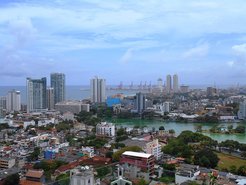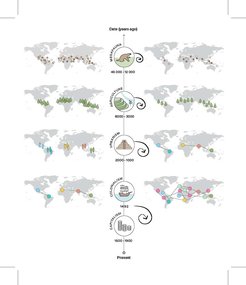Tropical Forests Reveal the Roots of the Anthropocene
A new paper in Nature Ecology & Evolution shows how interdisciplinary research into human-environment interactions can be used to understand the origins of the Anthropocene and address its contemporary challenges
Human activity has brought about a new age of our planet – the Anthropocene – pushing the Earth system to the brink of tipping points that can irreversibly alter the state of the planet. To navigate the challenges posed by the Anthropocene, we need a deeper understanding of how it began, including the feedbacks between human activity and different parts of the Earth system.

Although the rate of human impacts has accelerated in recent centuries, research into our species’ past reveals that people have been influencing the Earth system for millennia, and that thresholds of human-Earth system interactions may also have been traversed in the past. This is particularly the case in environments such as tropical forests where landcover change can have significant ramifications for different parts of the Earth system, from global biodiversity to the carbon cycle.
Now, a new paper led by researchers at the Max Planck Institute of Geoanthropology (MPI GEA) explores the potential of human activity in tropical forests to have initiated Earth system feedbacks in the past, arguing that archaeological, historical, and Indigenous perspectives should be included in the creation of planetary models. The authors focus on three major transitions in past human-environment interactions and present a framework for quantifying the potential of such changes to have wide-reaching impacts on the Earth system.
“To assess the risk of biogeophysical tipping points in the tropics on the one hand, and the potential for rapid socio-economic change on the other, we need to examine how past societies have interacted with tropical forests, and how both societies and forests changed as a result,” says first author Dr Patrick Roberts, leader of the isoTROPIC research group at MPI GEA.

The last decades have seen growing recognition of the importance of tropical forests for early human societies, revealing them as the setting of some major social transitions with large ecological effects. Using the adoption and expansion of agriculture, the emergence of urbanism in the tropics, and the arrival of European colonialism as case studies, the current paper demonstrates how insights from archaeological research, study of historical archives, and Indigenous sources can be combined with palaeoenvironmental data to create maps of land use and vegetation through space and time.
These models of land use and landcover change can be integrated with climate and soil models to measure ecological responses to human-caused changes on regional and global scales.
“Such new approaches, closing the loop to bring socio-cultural-technological dynamics explicitly into theory, analysis and models, are vitally important to understand the dynamics of the human-Earth System, from the deep past to its future,” concludes Prof Jürgen Renn, director of the MPI GEA.
By understanding how past human-Earth system interactions in the tropics have shaped present day ecosystem dynamics, the authors hope to inform future ecological policies and priorities.

